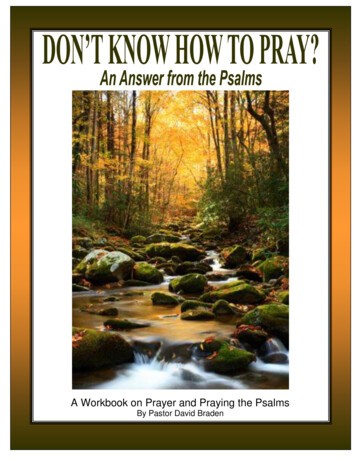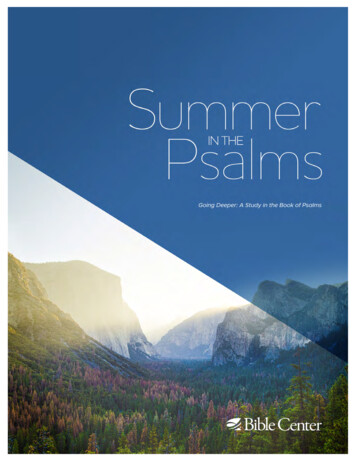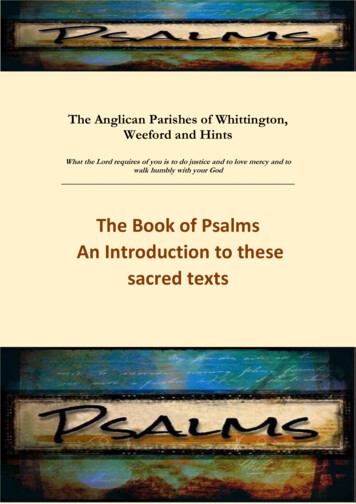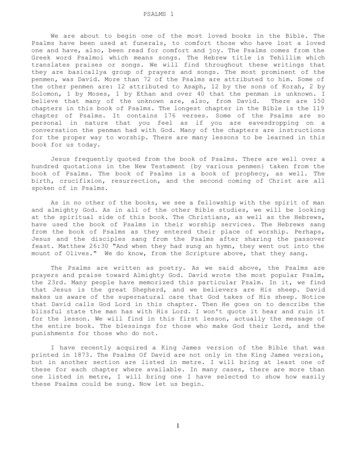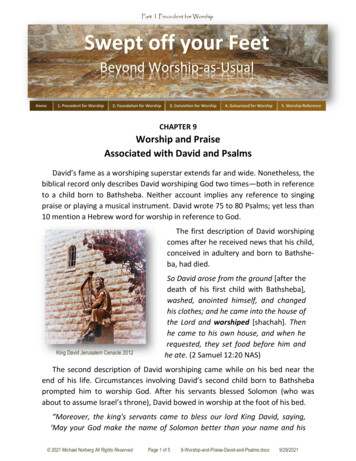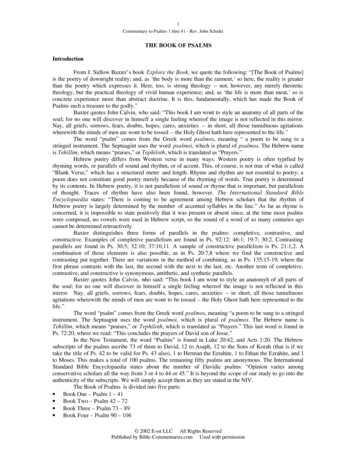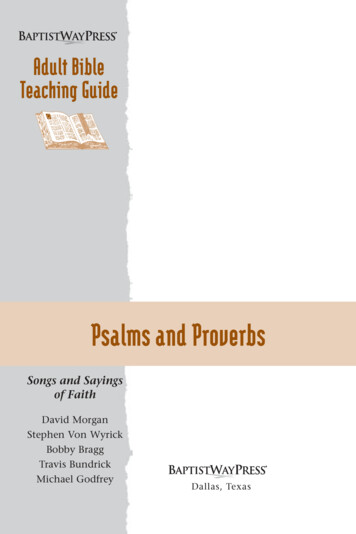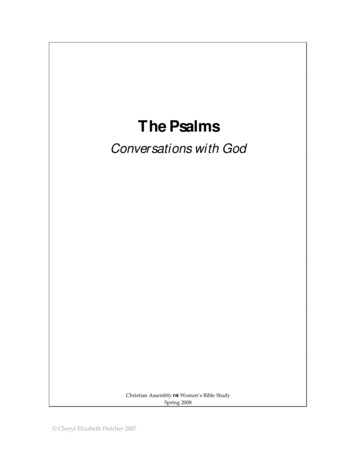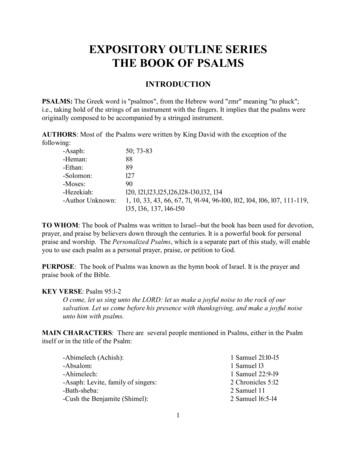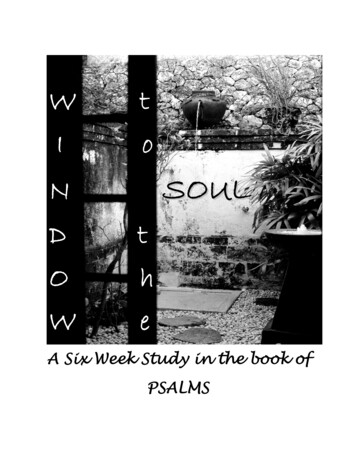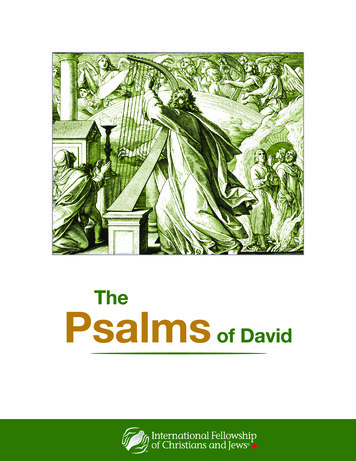
Transcription
Photo: iStockPhotoThePsalms of David
ThePsalms of DavidAN OVERVIEWThe book of Psalms—known to Jews by its Hebrew title, Tehilim, or Praises—unites Christians and Jews, whoview it as an aesthetically unmatched, yet gritty and honest, guide to worship for the people of God. KingDavid prepared this collection of songs and hymns for worship in the Temple in Jerusalem 3,000 years ago;yet the Psalms continue to inspire, comfort, and challenge us today. One Christian scholar says the total collection“became one of the most popular books in ancient Israel, and has remained so among countless millions of peoplethroughout the centuries.”How did we get the Psalms, how do we understand them, and what can they teach us today?AUTHORSHIPOnly seventy-four of the 150 psalms bear David’s name; twelve areattributed to Asaph; twelve to the sons of Korah; two to Solomon; oneto Moses; and one each to Heman and Ethan. Thirty-four psalms arenot attributed to any author at all.iStockphotos.comOne Talmudic source and nearly all Orthodox Jews believe that KingDavid was the author of all the psalms. He is known in the Bible as“the hero of Israel’s songs” (2 Samuel 23:1). Other sources say thatDavid collected the words of Adam, Abraham, Melchizedek, Moses,ten elders, and Ezra.Whoever the author or authors, the psalms uniquely gave voice to apeople’s hopes, sufferings, and dreams—and they still do today. WhileThe poetic talent of David, his personal influence,and the landscape of his life are revealedthe psalms were divinely inspired expressions of worship, lament, andthroughout the psalms.wisdom, many reflected influence from surrounding cultures. The formand structure of Canaanite literature from the city-state of Ugarit, for example, is reflected in 120 of the 150psalms. Egypt and Mesopotamia also produced psalms. Israel’s psalms, in a sense, were simply the latest andhighest development of an existing art form.David’s poetic talent, his influence, and indeed, his life can be seen throughout the psalms, and equally so inbooks of the Bible outside the psalms. Read his lament over Saul and Jonathan (2 Samuel 1:19–27) and his“last words” (23:1–7).Many of the psalms correspond with events in the life of David:1TBMN when Saul sent men to watch David’s house and kill him (1 Samuel 19:11)1TBMN when David fled to Gath (1 Samuel 21:10)ΞϮϬϭϴ /ŶƚĞƌŶĂƚŝŽŶĂů &ĞůůŽǁƐŚŝƉ ŽĨ ŚƌŝƐƚŝĂŶƐ ĂŶĚ :ĞǁƐ ŽĨ ĂŶĂĚĂ ŝĨĐũ͘ĐĂ ͮ ƉĂŐĞ Ϯ
7 ( 36 /06 2) ' 9,'1TBMN ZKHQ David pretended to be insane (1 Samuel 21:13)1TBMN ZKHQ David escaped to the cave of Adullam (1 Samuel 22:1) 1TBMN ZKHQ Doeg the Edomite informed Saul where David was(1 Samuel 22:9)iStockphotos.com1TBMN when the Ziphites betrayed David to Saul (1 Samuel 23:19)1TBMN when David was hiding from Saul in a cave (1 Samuel 24:1)1TBMN when David spared Saul (1 Samuel 24:11–12)1TBMN when David received forgiveness for his sin with Bathsheba(2 Samuel 12:13–14)1TBMN when David confessed his lustful and deceitful sin withBathsheba (2 Samuel 12:13–14)Though King Saul pursued David withmortal intent, David refrained fromreturning harm to “the LORD’s anointed.”1TBMN when David fled from Absalom (2 Samuel 15:14–16)1TBMN when Ziba refreshed David and his men (2 Samuel 16:2).1As many of the psalms have musical instructions, the author of the books of the Chronicles highlights David’smusical contributions to Temple worship (1 Chronicles 16:4–7). Ezra 3:10 points out that David prescribed thepriests and Levites to worship musically when the foundation was laid. The first century historian Josephus said,“David composed songs and hymns to God in varied metUes.”It is safe to say that David’s musical genius and commitment to the worship of God cast a refreshing OLJKWover the entire book of Psalms.STRUCTURE AND STYLELike the five books of Moses, Psalms is also divided into five books.Scholars also believe David compiled Book I (1–41) and Book IV(90– 106), and wrote many of the psalms in Book II (42–72).Scholars also believe Psalms 9 and 10, and 42 and 43, respectively,were probably originally one psalm.8PSE 4USVDUVSF Each line contains two to four words, each ofwhich is accented, forming a simple metrH. The most common metrHhas three words or word units in the first line and three in the second,forming a 3 3 metUe. Others are 2 2, 3 2, and 3 3 3.iStockphotos.comThe psalms exhibit the following literary features of Hebrew poetry.2The book of Psalms, or Tehilim in Hebrew (Praises),unites Christians and Jews alike in worshippingthe Lord.1BSBMMFMJTN A repetition of thought rather than sound. The basic unit is a balanced couplet with pausesat the middle and end. There are several types of parallelism, including: (1) antithetic, which provides acontrast between the lines (Psalm 90:6); (2) synthetic, in which the second line supplements or completes thefirst (Psalm 3:4); and (3) climactic or stair-like, in which part of the first line is repeated, moving the thoughtforward with an extra step, sometimes using a triplet (Psalm 29:1–2)."DSPTUJD 1TBMNT Each verse begins with a successive letter of the 22-letter Hebrew alphabet(Psalms 9, 10, 25, 34, 37, 111, 112, 145). Psalm 119, meanwhile, features 22 eight-verse sections, each ofwhich begins with a different letter.ΞϮϬϭϴ /ŶƚĞƌŶĂƚŝŽŶĂů &ĞůůŽǁƐŚŝƉ ŽĨ ŚƌŝƐƚŝĂŶƐ ĂŶĚ :ĞǁƐ ŽĨ ĂŶĂĚĂ ŝĨĐũ͘ĐĂ ͮ ƉĂŐĞ ϯ
7 ( 36 /06 2) ' 9,'CONTENTScholars suggest the following main categories of the Psalms.31SBJTF “The Hebrew title, ‘Praises’ (Tehilim), defines accurately a large partof the contents of the book,” Walter Elwell notes. “Each of the first four sectionsconcludes with a doxology, while the fifth section concludes with five psalms, eachof which begins or ends with one or two ‘Hallelujahs.’ Psalm 150 sounds the call tototal praise. God is to be praised for his being, for his great acts in creation, nature,and history, on both the individual and the communal level.” Examples: Psalms 9,29, 47, 103, and 124.The Royal Psalms ultimately point beyond Israel’s earthly kings, who ruled forless than 500 years, to a coming messianic king. Examples: Psalms 2, 18, 20, 21,45, 61, 72, 89, 101, 110, 132, and 144.iStockphotos.com PODFSOJOH UIF %BWJEJD ,JOH Also known as the Royal Psalms, thesecompositions refer to the king, his rule, and his relationship to the Lord. While theking enjoys an exalted relationship with God (see Psalms 2 and 110), his rule is notabsolute and is subject to the conditions of God’s covenant with His people.The impact and influence of David andhis psalms upon the children of God andour world today are well-rememberedthrough the image of the Tower of Davidin the Old City of Jerusalem.;JPO “Praise of Zion,” Elwell says, “was, in fact, almost synonymous with praise of the Lord who dwelt there.Jerusalem’s continued survival, in spite of its vicissitudes, was ample demonstration of God’s enduring greatness . . . and peculiar affection for the city which housed his temple.” Examples: Psalms 48, 76, 84, 87, and 122.-BNFOUT There are two main kinds—national (because of drought, war, etc.; Psalms 14, 44, and 60),and individual (Psalms 13 and 22). Psalms of individual lament constitute “the backbone of the psalter” andfrequently conclude with praise to God. There are fifty individual lament psalms, which can be further subdividedinto imprecatory (Psalm 109), passion (Psalm 16), and penitential (Psalm 32).8JTEPN These compositions reflect the approach of Job, Proverbs, and Ecclesiastes. Wisdom involves bothknowing and doing the right thing, based upon God’s law. It involves both intellect and morality. Examples:Psalms 1, 37, 49, 73, 127, and 128.VALUE OF THE PSALMSThe Psalms is a God-focused book. It casts a spotlight on Him as both Creator and as Covenant-Keeper.Christians and Jews see and are comforted by its clear depiction of human suffering, sin, and hope.Rabbi Boruch Clinton says, “For centuries, Jews have turned to Psalms to givevoice to their deepest feelings, both in times of great trouble and of great happiness.Psalms can unlock our hearts and draw us up towards their exalted greatness. Thisis a book worthy of our attention; both academic and emotional!”The practice of reading a daily psalm, which began with the Levites in theTemple, has become a standard practice in the synagogue ritual in all Jewishcommunities. The reading of the psalm is preceded by the declaration: “Today isday [Sunday, Monday, etc.] on which the following psalm was recited inthe Temple.”ΞϮϬϭϴ /ŶƚĞƌŶĂƚŝŽŶĂů &ĞůůŽǁƐŚŝƉ ŽĨ ŚƌŝƐƚŝĂŶƐ ĂŶĚ :ĞǁƐ ŽĨ ĂŶĂĚĂ ŝĨĐũ͘ĐĂ ͮ ƉĂŐĞ ϰiStockphotos.comAs a fixed order of Hebrew prayer developed, many psalms were incorporatedinto the corporate prayer book.The book of Psalms brings comfort,peace, and refreshing reassurance inGod’s love and care for each of us.
7 ( 36 /06 2) ' 9,'According to custom, on the first day (Sunday), Psalm 24 is recited; on the second day, Psalm 48; the thirdday, Psalm 82; fourth day, Psalm 94; on the fifth day, Psalm 81; on the sixth day, Psalm 93; and on the seventh,and Sabbath day, Psalm 92.4Many Jews today recite psalms daily, some completing the entire book each week; others completing itaccording to a monthly cycle. Certain psalms, by custom, have been assigned for certain occasions.For example, for those who have been rescued from a dangerous situation, Psalm 107 is recited. Thoseseeking guidance recite Psalm 139, and those needing God’s mercy in troubled times recite Psalm 38.Indeed, the great Jewish thinker and commentator Nahmanides cited seventy-two verses in Psalms asappropriate for specific needs and occasions, such as healing, safety in travelOing, finding lost property, winninglitigation, and others.5For Christians and Jews alike, the psalms give us divine sanction to pour out our complaints, fears, and praisesto God as we await His ultimate victory. The psalms, with a main purpose of encouraging and directing Templeworship, nonetheless have spoken to individual followers after God and provided a cherished pattern for personalfaith. In this, they reflect the incomparable life modelOed by their greatest champion, King David.SOURCES9HIIP )VY\JO *SPU[VU 7ZHSTZ ;LOPSPT ¹ O[[W! [VYHO VYN SLHYUPUN IHZPJZ WYPTLY [VYHO WZHSTZ O[TS HS[LY ( ,S LSS LK Baker Encyclopedia of the Bible .YHUK 9HWPKZ! )HRLY 7\ISPZOPUN .YV\W 1VOU )YPNO[ A History of Israel, ;OPYK ,KP[PVU 7OPSHKLSWOPH! LZ[TPUZ[LY 7YLZZ *OHPT 7LHYS LK The Encyclopedia of Jewish Life and Thought 1LY\ZHSLT! *HY[H ;OL 0ZYHLS 4HW HUK 7\ISPZOPUN *VTWHU ENDNOTES)HZLK VU [OL JOHY[ PU HS[LY ( ,S LSS LK Baker Encyclopedia of the Bible .YHUK 9HWPKZ! )HRLY 7\ISPZOPUN .YV\W ! )HZLK VU [OL KPZJ\ZZPVU VM HS[LY ( ,S LSS LK Baker Encyclopedia of the Bible .YHUK 9HWPKZ! )HRLY 7\ISPZOPUN .YV\W ! ¶ )HZLK VU [OL KPZJ\ZZPVU VM HS[LY ( ,S LSS LK Baker Encyclopedia of the Bible .YHUK 9HWPKZ! )HRLY 7\ISPZOPUN .YV\W ! ¶ )HZLK VU [OL LU[Y 7ZHST VM [OL H ¹ Y *OHPT 7LHYS LK The Encyclopedia of Jewish Life and Thought 1LY\ZHSLT! *HY[H ;OL 0ZYHLS4HW HUK 7\ISPZOPUN *VTWHU W )HZLK VU [OL LU[Y 7ZHSTZ ¹ Y *OHPT 7LHYS LK The Encyclopedia of Jewish Life and Thought 1LY\ZHSLT! *HY[H ;OL 0ZYHLS 4HW HUK7\ISPZOPUN *VTWHU WW ¶ ΞϮϬϭϴ /ŶƚĞƌŶĂƚŝŽŶĂů &ĞůůŽǁƐŚŝƉ ŽĨ ŚƌŝƐƚŝĂŶƐ ĂŶĚ :ĞǁƐ ŽĨ ĂŶĂĚĂ ŝĨĐũ͘ĐĂ ͮ ƉĂŐĞ ϱ
7 ( 36 /06 2) ' 9,'David’s Legacy of PrayerRabbi Joseph Soloveitchik, the renowned 20th-century leader of YeshivaUniversity in New York, described prayer as “the expression of the soulthat yearns for God, via the medium of the word, through which thehuman being gives expression to the storminess of his soul and spirit.”In other words, prayer is connecting with God through our words.According to tradition, the practice of prayer canbe traced back to Adam, continued throughthe examples and lives of Israel’s patriarchs andmatriarchs, through Moses, the kings and the prophets,into the Christian Bible, as Jesus modelMed prayer forhis followers throughout his life. Prayer was, andcontinues to be, the most natural manifestation of ourrelationship with God.However, it was King David whorevolutionized prayer through the giftof the Psalms that he bequeathed tous. The Psalms are largely a collectionof David’s own personal prayers —powerful and deep, running the gamutof emotions and human experiences,from despair to praise; gratitude to lament.when we are going through difficult times. David’sbeautiful prayers of praise, thanksgiving, petition, andconfession, recorded in the psalms give words to ourfeelings, unlocking our thoughts and emotions so thatthey may be fully expressed to God. It was only naturalthat when the Jewish sages began to create a set textfor prayer at the end of the Second Temple period thatDavid’s Psalms were included.Let everything that hasbreath praise the LORD.Praise the LORD.— Psalm 15 0 : 6While others contributed to this collection ofpsalms, David is credited with the work becausehe compiled them and established them as a formof worship. It was David, “the hero of Israel’s songs”(2 Samuel 23:1), who instituted the practice ofworship accompanied by soul-stirring music andinspirational words.In essence, David created the foundation for Jewishliturgy, though it would take centuries for his psalms tomake their way into any kind of formal prayer text.Prayer has always had a prominent place in Judaism.Until David, it was always spontaneous, personal,and mostly private. This kind of prayer, still practicedtoday, has its benefits. It is often most heartfelt andmost powerful. However, the Psalms offer us a valuablealternative pathway through which we can connectwith God.Sometimes, we simply cannot find sufficient wordsto praise God. Or, we are often rendered speechlessPart of what makes the Psalms sounique is that they are both our words toGod, yet as part of the Bible, they are alsoundeniably God’s words to us. This uniquecombination makes the Psalms the perfectvehicle where we can meet God in themost profound way.This is why Psalms have become so essential in boththe Christian and Jewish faiths. They are the wordswe turn to in our greatest time of need, and words ofpraise we sing in times of jubilation. For millennium,the Psalms have been the companion of people of faiththroughout the journey of life. Through the ups anddowns, good times and challenging ones, joy and despair,there is a Psalm for every moment and emotion.Perhaps David’s greatest contribution is he teachesus, through the Psalms, that we can always praise Godno matter what. He concluded the book with thesewords, “Let everything that has breath praise the LORD.Praise the LORD” (Psalm 150:6).The sages offer an alternative reading of this verse:“Praise the Lord for every breath.” As long as we arealive, there is a way and reason to praise God. Every dayis a time to pray, to praise, to give thanks, to ask, and toconnect with our Creator.“Let everything that has breath praise the LORD.Praise the LORD.” Amen!ΞϮϬϭϴ /ŶƚĞƌŶĂƚŝŽŶĂů &ĞůůŽǁƐŚŝƉ ŽĨ ŚƌŝƐƚŝĂŶƐ ĂŶĚ :ĞǁƐ ŽĨ ĂŶĂĚĂ ŝĨĐũ͘ĐĂ ͮ ƉĂŐĞ ϲ
BUILDING BRIDGES, SAVING LIVES5 I F 1 4 " - . 4 P G % B W J ETEN BIBLICAL LESSONS ON GOD’S MYSTERIOUS MESSENGERS5IF CPPL PG 1TBMNT LOPXO UP FXT CZ JUT )FCSFX UJUMF 5FIJMJN PS 1SBJTFT VOJUFT ISJTUJBOT BOE FXT XIP WJFX JU BT BO BFTUIFUJDBMMZ VONBUDIFE ZFU HSJUUZ BOE IPOFTU HVJEF UP XPSTIJQ GPS UIF QFPQMF PG (PE ,JOH %BWJE QSFQBSFE UIJT DPMMFDUJPO PG TPOHT BOE IZNOT GPS XPSTIJQ JO UIF 5FNQMF JO FSVTBMFN ZFBST BHP ZFU UIF 1TBMNT DPOUJOVF UP JOTQJSF DPNGPSU BOE DIBMMFOHF VT UPEBZ 0OF ISJTUJBO TDIPMBS TBZT UIF UPUBM DPMMFDUJPO iCFDBNF POF PG UIF NPTU QPQVMBS CPPLT JO BODJFOU *TSBFM BOE IBT SFNBJOFE TP BNPOH DPVOUMFTT NJMMJPOT PG QFPQMF UISPVHIPVU UIF DFOUVSJFT wRABBI YECHIEL ECKSTEINIn 1983, Rabbi Eckstein founded the International Fellowship of Christians and Jews(The Fellowship), devoting his life to building bridges of understanding betweenChristians and Jews. Under his leadership, The Fellowship now raises over 130million globally, making it the largest Christian-supported humanitarian nonprofitworking in Israel today.Rabbi Eckstein is the author of 10 highly acclaimed books, including HowFirm a Foundation: A Gift of Jewish Wisdom for Christians and Jews, and The OneYear Holy Land Moments Devotional. His daily radio program, Holy Land Moments(Momentos en Tierra Santa), is now heard in English and Spanish on more than1,500 stations on five continents, reaching more than 9.1 million listeners weekly.YAEL ECKSTEINAs senior vice president of the International Fellowship of Christians and Jews (TheFellowship) in the office of the president, Yael Eckstein oversees all ministry programsand serves as the global spokesperson for the 130 million organization. Prior toher present duties, Yael held the position of director of program development andministry outreach. Based in Jerusalem, Yael is recognized as a published writer, arespected social services professional, and an expert on Jewish-Christian relations.Her most recent book, Spiritual Cooking with Yael, is a celebration of her lovefor cooking healthy, simple, delicious food for her family and dozens of weeklyShabbat guests.IFCJ.CA1-855-311-4325
BUILDING BRIDGES, SAVING LIVESThe International Fellowship of Christians and Jews, a philanthropic organization,was founded in 1983 to promote better understanding and cooperation betweenChristians and Jews, and build broad support for people in need. IFCJ Canada,established in 1999, has delivered over 60 million in support of humanitarian programs aiding the elderly, sick, orphaned and at-risk populations in Israel, the formerSoviet Union and other areas of the world.BLESSING ISRAELIS AND JEWS IN NEED AROUND THE WORLD Guardians of Israel — Assisting needy peoplein Israel with food and other lifesaving needs Isaiah 58 — Providing lifesaving aid and assistanceto impoverished Jews in the former Soviet Union On Wings of Eagles — Bringing suffering Jews tothe Holy Land aboard Fellowship Freedom FlightsUNDERSTANDING THE JEWISH ROOTS OF THE CHRISTIAN FAITH Daily devotionals and Hebrew Word ofthe Day from Rabbi Eckstein LimmudLimmud, online monthly biblical studies Teaching videos on the Jewish roots of Christianity Online resources on Jewish holy days and festivals Holy Land Moments daily radio program onJewish life, culture, history, and faithHELP SUPPORT THESE LIFESAVING PROGRAMS Visit our web site at IFCJ.CA — Find out howyou can donate, get involved, and stay informed Call 888-988-4325 — to speak with us directlyP.O. Box 670, Station KToronto, ON M4P 2HlCANADA ISRAEL SOUTH KOREA UNITED STATES 2016 International Fellowship of Christians and Jews of Canada IFCJ.CACharitable Registration Number: 86941 1587 RR0001
psalms. Egypt and Mesopotamia also produced psalms. Israel’s psalms, in a sense, were simply the latest and highest development of an existing art form. David’s poetic talent, his influence, and indeed, his life can be seen throughout the psalms, and equally so in books of the
